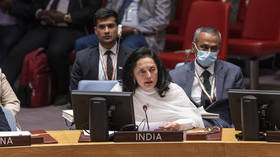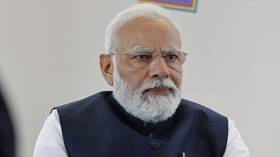India calls for UN Security Council reform

The United Nations Security Council (UNSC) needs urgent reform to increase representation for “emerging economies and regions with growing political influence,” India’s permanent representative to the UN argued on Thursday.
“The current composition of the Security Council no longer aligns with the realities of our interconnected and multipolar world,” Ruchira Kamboj said during a roundtable discussion on Security Council reform at the UN headquarters in New York, hosted by the permanent missions of Brazil, India, South Africa and Saint Vincent and the Grenadines.
She added that the council’s structure was designed in a “different era,” and fails to give sufficient voice to “the rise of new powers, the shifting geopolitical landscape and the aspirations of nations striving for a fairer and more equitable global order.”
It is a “pragmatic necessity,” the Indian diplomat argued, to expand the Security Council's membership in both the permanent and non-permanent categories to countries which have demonstrated on the global stage a desire to promote peace, aid economic development, and address other global challenges.
The United Nations Security Council was formed following World War II as a means for countries to collaborate on global security challenges. Its five permanent members – the United States, Russia, China, France and the United Kingdom – each have veto power on matters relating to sanctions, international negotiations, the deployment of peacekeeping missions, and the authorization of the use of force to address conflicts.
The UNSC also has a range of non-permanent members, admitted on a rotational basis depending on their geographic regions. Among the ten current non-permanent members are Japan, Brazil, Switzerland and the United Arab Emirates.
The topic of UNSC reform is regularly raised. “Everyone agrees that the present structure [of the UNSC] is flawed,” British international relations expert Paul Kennedy wrote in his 2006 book ‘The Parliament of Man’. “But consensus on how to fix it remains out of reach.”
India, along with Brazil, Japan and Germany, has on several occasions lobbied to be included in an expanded list of permanent members. However, nations including Italy, Canada, Spain and South Korea are among a group called ‘United for Consensus’ which has, since the 1990s, formally opposed any proposals to expand the UNSC permanent member base.
Kamboj argued that modern challenges require modern solutions, and that UNSC reform is made more urgent by “unprecedented global challenges” such as climate change, terrorism and pandemics, which “require collective efforts and shared responsibilities.”













